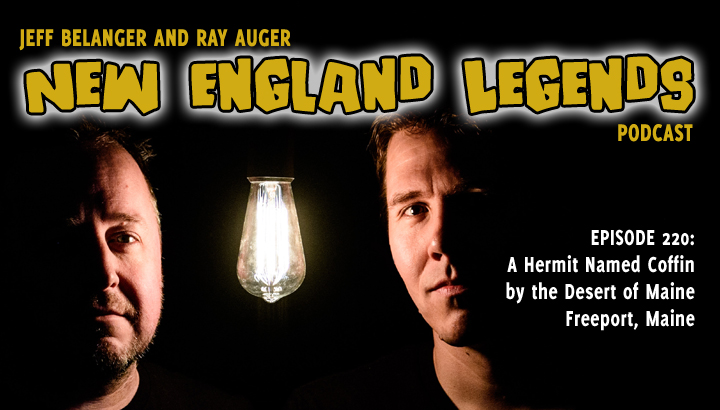

In Episode 220, Jeff Belanger and Ray Auger head to Freeport to explore the Desert of Maine. While there, they search for a man named Coffin, the Hermit of Maine, who lived nearby and charged tourists 15 cents to look inside his shack. How did a desert appear in Maine? And who was this hermit?
CALL (OR TEXT) OUR LEGEND LINE:
(617) 444-9683 – leave us a message with a question, experience, or story you want to share!
BECOME A LEGENDARY LISTENER PATRON:
https://www.patreon.com/NewEnglandLegends
CREDITS:
Produced and hosted by: Jeff Belanger and Ray Auger
Edited by: Ray Auger
Theme Music by: John Judd
SUBSCRIBE TO THE PODCAST FOR FREE:
Apple Podcasts/iTunes | Google Podcasts | Spotify | Pandora | Stitcher | Amazon Podcasts | TuneIn | iHeartRadio
JOIN OUR SUPER-SECRET:
New England Legends Facebook Group
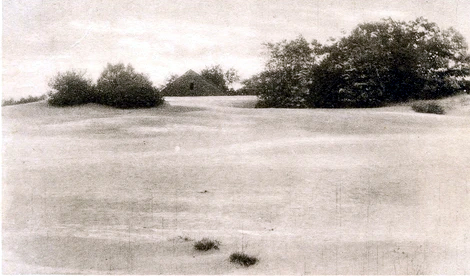
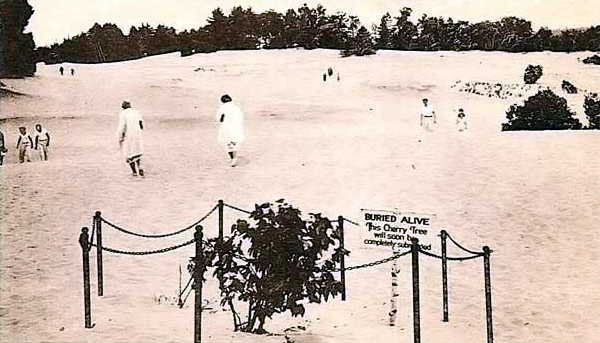
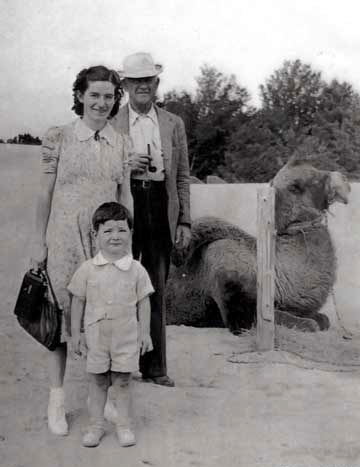
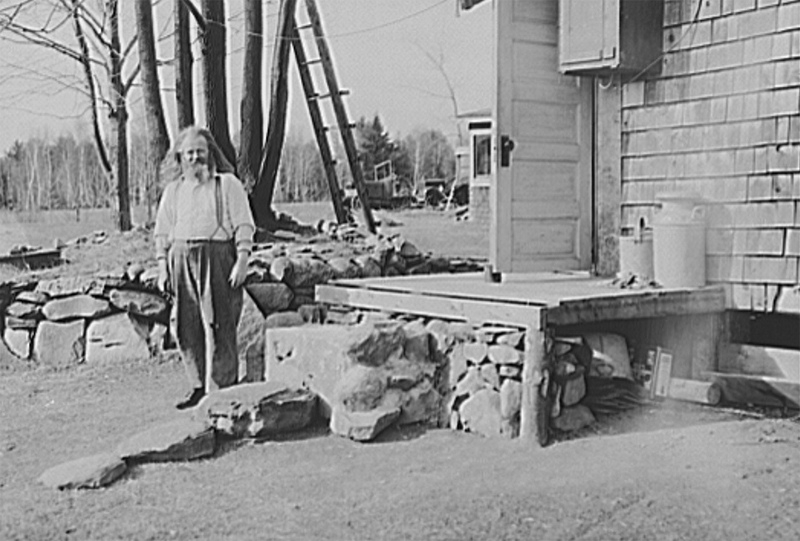
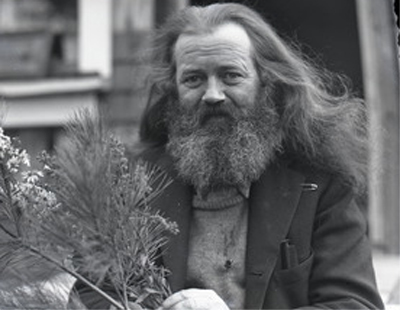
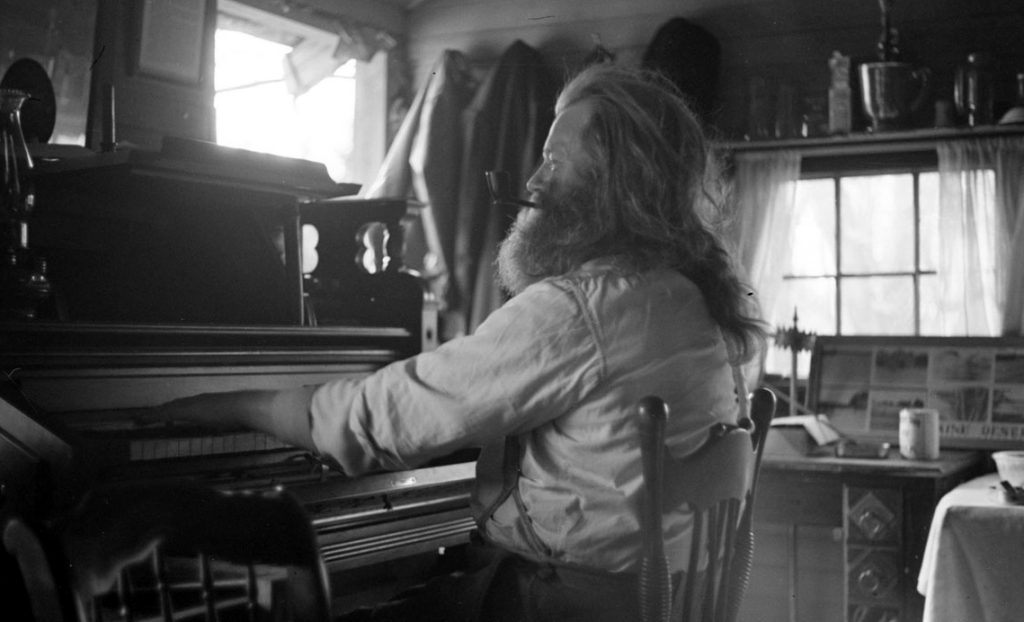
EPISODE TRANSCRIPT:
*A note on the text: Please forgive punctuation, spelling, and grammar mistakes. Like us, the transcripts ain’t perfect.
[CAR DRIVING]
JEFF: Okay, we’re going to make a left up here…
[BLINKER]
JEFF: And our destination is at the end of this road.
RAY: Okay. Uhhhmmm Jeff… why are you dressed in all khaki? And… is that a pith helmet?
JEFF: It is! I’m dressed like this because, we’re heading to the desert…
RAY: In Freeport, Maine?
JEFF: Yes, in Maine. We’re heading to the desert in search of a hermit.
[INTRO]
JEFF: Hello! I’m Jeff Belanger, and welcome to Episode 220 of the New England Legends podcast. If you give us about ten minutes, we’ll give you something strange to talk about today.
RAY: And I’m Ray Auger. Thanks for joining us on our mission to chronicle every legend in New England one story at a time. We’re a community of legend-seekers who love sharing stories that make New England unique. Whether it’s our haunts and monsters, our strange history, or roadside oddities and the memorable people who have stuck out over time and reached legendary status. We love when you connect with us, and share what we do with a friend or two.
JEFF: Before we hit the desert of Maine, we want to take just a minute to tell you about our sponsor, Nuwati Herbals!
RAY: Yup, it’s November, and it’s turning colder. Do you notice how on those chilly days, even your bones and joints seem to ache?
JEFF: We’re getting older, Ray.
RAY: True, but it’s more than that. Sometimes I need to get warmed up from the inside. Instead of hitting the drive-through for some over-priced sugar and caffeine-filled concoction that isn’t really good for me anyway, I’ve been making some afternoon Buffalo Bone Tea from Nuwati Herbals.
JEFF: That’s a good choice! Buffalo Bone Tea has alfalfa leaf, dandelion root, marshmallow root, plantain leaf, and other natural ingredients to help support our body’s structure. And reading the tea’s label here: No, it doesn’t actually contain buffalo bones, and it won’t give you buffalo breath.
RAY: That’s good! So many Nuwati Herbal products have become part of my daily life. Their teas, their balms and lotions, and their bath salts, have all made a difference in the way I feel each day.
JEFF: Let Nuwati Herbals help support your healthy lifestyle. Check out the Nuwati Herbals Web site to see all of their great products AND you legendary listeners get 20% off your order when you use the promo code LEGENDS20 at checkout. Visit Nuwati Herbals dot com. That’s N-U-W-A-T-I Herbals with an S dot com.
[CAR DRIVING]
RAY: Okay, Jeff. You said we’re heading to a desert? In Maine? I didn’t know New England had ANY deserts!
JEFF: It turns out there’s one in Maine. And it’s been a tourist attraction for almost a century.
[CAR STOPPING / DOORS CLOSING]
RAY: Wow… you weren’t kidding! It’s a desert! I mean, it’s not a huge area. In fact, the sign tells me it’s about 40 acres. Not exactly the Sahara, but it’s all sand surrounded by walls of pine trees. It almost looks like a big golf course, but instead of grass fairways, it’s all sand.
JEFF: Today the desert of Maine is a campground, and a place you can pay to visit during the warmer months of the year. But a century ago this place got famous not just because of what it is, but for a strange hermit who lived nearby. A hermit by the name of Coffin.
RAY: Great name!
JEFF: To figure out how this got here, let’s head back to 1797, and meet the Tuttle Family.
[TRANSITION]
[SPRING SOUNDS]
RAY: It’s the Spring of 1797, and William Tuttle has just bought 300 acres of land right here where we’re standing. Tuttle gets to work. He builds a large barn.
[HAMMERING AND SAWING]
RAY: He grows potatoes. And let’s his flock of sheep graze the pastures.
[SHEEP]
JEFF: Pretty soon, this place looks like a big, successful farm. Things are going well for the Tuttles.
RAY: Years pass, and William Tuttle passes his farm on to his kids who continue to grow potatoes in the same fields where their father grew them. They let their sheep graze in the same pastures. But now there’s even more sheep. It’s a lot of work to run a farm, but the family has it down now.
JEFF: Buuuut… there’s a problem.
RAY: What’s that?
JEFF: When you have a farm, you’re supposed to turn the crops.
RAY: What does that mean?
JEFF: It means you can’t grow the same exact crop in the same exact fields year after year because each plant pulls different nutrients from the soil. If you never change the crop, over time the soil is depleted, and pests and weeds can move in to make life difficult. Eventually, you need to get rid of the soil and add new dirt again.
RAY: That makes sense. So I take it the Tuttles aren’t rotating their crops?
JEFF: Nope, it’s just potatoes year after year. By the 1860s, their soil is starting to sour. But there’s another problem.
RAY: What now?
JEFF: Those sheep?
[SHEEP]
JEFF: They’re allowed to overgraze in the pasture.
RAY: What’s wrong with that?
JEFF: It’s not the biggest problem if you have plenty of land and can move the sheep on to a different pasture which allows the eaten field to regrow. But the Tuttles are letting the sheep eat just about everything. Eventually, it becomes a big problem.
RAY: Hey, look over there… I can see Mr. Tuttle pointing to a strange spot in the field. Let’s go check it out.
[WALKING ON GRASS]
RAY: Huh… look at that. There’s this patch of sand. It’s not very big, maybe the size of a dinner plate. And it looks like beach sand.
JEFF: That IS strange. But no big deal. It’s just one little patch of sand.
RAY: Right. No big deal. Weeks go by, and suddenly another patch of sand catches Mr. Tuttle’s eye… and then there’s another patch.
JEFF: And then another….
[SHEEP]
RAY: The more the sheep graze the fields, the more patches of sand show up. And pretty soon, those patches aren’t the size of dinner plates anymore. They’ve grown into pond-sized fields of sand.
JEFF: And now there’s a much bigger problem…
[WIND]
JEFF: When winds and storms blow through, it’s picking up the sand and laying it across the potato fields like a blanket of snow. Pretty soon, the Tuttle Farm is a total loss. Inches of sand are covering all the fields and piling up against the barn and house. The Tuttles are forced to abandon their farm and move on.
RAY: Locals start referring to this place as the Tuttle Sand Farm.
JEFF: Sand dunes build up on parts of the property. They engulf some of the apple trees on the farm, and then get blown over a week later revealing the apple tree again. And while this place is a total failure as a farm, locals like to hang out here on the sand. They have picnics, and sometimes the younger folks throw parties into the night. Especially during prohibition in the 1920s.
RAY: Why not, right? It’s abandoned. It’s unique. And no one will see you drinking out here.
JEFF: But one night, one of these parties rages late into the night… suddenly there’s a fire!
[FIRE]
JEFF: The old Tuttle house is engulfed in flames. Everything burns but the barn. The place is a mess. It’s 1925, when a man named Henry Goldrip shows up. Where everyone else sees a mess, Henry sees an opportunity. He buys the sand farm for $400 in back taxes. Some folks laugh at his folly. They tell him this mountain of sand isn’t worth $40. They laugh and laugh… But Henry has plans. Route one is only two miles away. If all of those tourists heading up and down Maine’s coast knew this place existed, maybe they’d pay to see it.
RAY: Tourists need more than just sand to show up, so Henry sells ice cream and hotdogs, and offers walking tours. It’s Goldrip who brands this place: The Desert of Maine.
JEFF: We should point out, that this quote “desert” does fall short of the standard definition.
RAY: How so?
JEFF: Deserts are defined as arid land with sparse vegetation.
RAY: Okay… we got that.
JEFF: It needs to be desolate.
RAY: Yup. Check still got there.
JEFF: Technically there’s no size requirement on a desert, so we’re still okay there. But the last requirement is less than 10 inches of rainfall per year.
RAY: Freeport averages about 50 inches per year. Got it. But these are technicalities. When I look around, I see a desert.
JEFF: Agreed. Pretty quickly, Henry Goldrip’s $400 bet pays off. Tourists come by. They pay to see it. They buy ice cream, and they take tours. Word spreads, and the legend of this roadside attraction grows.
RAY: Henry Goldrip’s tours explain how the desert of Maine was created. It turns out, during the ice age more than 25,000 years ago, giant glaciers moved south across all of this land. Those glaciers ground up the rocks and earth below into fine sand. When the glaciers retreated, the sand settled. Over time, moss and ferns grew up through the sand. Trees came in and other plants. Over the course of centuries, top soil formed from rotted trees and leaves and other natural cycles of nature to the point where all of the sand was hidden just below the surface. Then the Tuttle Farm moved in allowed grazing sheep and unturned crops to undo all of this growth in a matter of decades. Pretty soon, the Desert of Maine was so popular, that cars started lining up from Route 1 all the way along the two-mile stretch of road to the Desert site.
JEFF: The traffic is a nightmare. Thankfully, not too many people live along this empty road leading up to the Desert of Maine. But there is this one family also situated along the road: Leonard and Marion Allen. They too have a farm. It’s the Allens who see all of this traffic and get an idea.
[DING]
JEFF: So they build a shack along the road…
[SAWING HAMMERING]
JEFF: And invite a local vaudeville musician named Charlie Coffin to set up a shop in there. Sell his trinkets and paintings, and charge people to look inside.
RAY: I guess if tourists will line up to see a bunch of sand, maybe as they creep by this shack, they might pay a few pennies to get entertained.
[HAMMERING A NAIL]
JEFF: Coffin hangs out a sign: And encourages passersby to pay 15 cents to come see the Hermit of Maine!
RAY: Nothing like a hermit who advertises!
JEFF: Pretty soon, the hermit is a hit.
RAY: Charlie Coffin looks the part, too. He’s got the beard, long hair, and looks just disheveled enough. So people stop to take a closer look.
[CASEY JONES SONG]
JEFF: Charlie Coffin plays his organ and sing songs like “Casey Jones,” as visitors look around his shack and buy his paintings and trinkets. Coffin spends years living off the fat of the Desert of Maine’s fame. And that brings us back to today.
[TRANSITION]
RAY: Charlie Coffin died in 1941 at the age of 47. Though his legend lives on thanks to the countless photos taken of him in life. As hermits go… he wasn’t shy. And he’s not the first enterprising hermit we’ve covered on the podcast.
JEFF: No he’s not. Back in Episode 99 we covered the story of English Jack, the Hermit of the White Mountains of New Hampshire. He also charged people to look inside his shack and also sold trinkets and souvenirs.
RAY: Which is counter to everything a hermit is supposed to be, right? I mean, a hermit is supposed to be reclusive. To live out somewhere alone away from people.
JEFF: And yet we’re fascinated with hermits because we wonder if they’ve acquired some divine knowledge, so we seek them out. The very clever and enterprising hermits understand their built-in appeal and advertise it. I mean, how often does one get to see a hermit?
RAY: I guess every day of the week if you’re heading to the Desert of Maine in Freeport during the summer.
JEFF: Good point. The Desert of Maine is still an area attraction. In the summer months you can camp here and still take tours. But you might want to hurry if you’d like to see it.
RAY: Why’s that?
JEFF: Because it’s shrinking. With no more sheep and farm, the trees and mosses are coming through once again. Give this place a few centuries and it could be a forest once again.
RAY: You never know when a piece of land will turn into something more than a local oddity, and when an enterprising sort of person will show up on the scene and become a local legend.
[OUTTRO]
RAY: You can see historic pictures of Charlie Coffin and the Desert of Maine on our Web site. Just click on Episode 220.
JEFF: While you’re on our Web site you can see everything else we do as well! There’s a link to buy the 2022 Haunted New England wall calendar, a link to download our free smart phone app developed by Forest City marketing, links to the New England Legends television series, and of course a link to our Patreon page!
RAY: Our patreon patrons are the backbone of everything we do. For just $3 bucks per month they get early access to new episodes, plus bonus episodes and content that no one else gets to hear. If you can help support us, head over to patreon.com/newenglandlegends to sign up.
JEFF: We’d like to thank everyone for the great feedback on our Halloween special last week. Maybe we’ll do more episodes like that in the future. And our theme music is by John Judd.
CLOSING: Hi, I’m Amelia from Georgetown, Massachusetts, and remember the bizarre is closer than you think.
